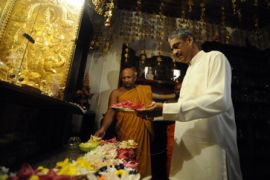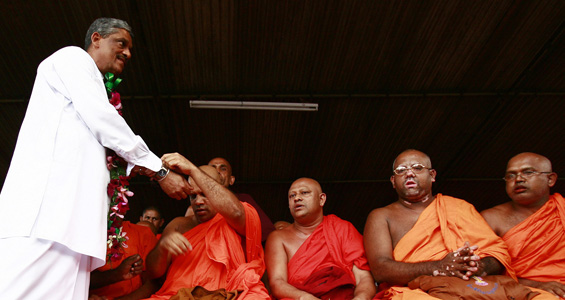Profile: General Sarath Fonseka
Ex-Sri Lankan general has had a bitter fallout with country’s president.

 |
| Fonseka has been a frequent critic of the government, even while in office [Reuters] |
General Sarath Fonseka, Sri Lanka’s former army commander who was feted as the architect of the military’s victory over the separatist LTTE, or Liberation Tigers of Tamil Eelam, has had a bitter fallout with the country’s president, Mahinda Rajapaksa.
The former army chief has been sentanced to three years in jail after being found guilty of making a false allegation against the president’s brother.
Fonseka was found guilty on Friday of spreading rumours that Rajapaksa’s brother, who is also Sri Lanka’s defence secretary, had ordered the killing of Tamil Tiger leaders as they tried to surrender.
He contested against Rajapaksa in the 2010 presidential election and lost. But a far worse ignominy that he has had to suffer was when military police “dragged him away”, allegedly for plotting a coup against the government.
Speculation of strained relations between the general and his commander-in-chief surfaced as far back as July 2009 when Fonseka was asked to retire from his role as army chief.
He was then appointed chief of defence staff (CDS), a senior position overseeing the armed forces, but one that did not carry operational authority.
Often seen but not heard – permission to interview him and other service chiefs had to be obtained from the defence secretary and was often refused – the general became vocal in the weeks running up to the election.
He criticised what he described as the government’s inability to secure the peace and to consolidate the victory over the LTTE, which came at a high price.
He also attacked the government for its failure to act on corruption.
Fonseka singled out the president, alleging nepotism and favouritism and a tenure he said was driven by self-interest.
Career achievements
Fonseka was the first serving officer to be appointed a four-star general in Sri Lanka’s military history – in reward and recognition for his role in the comprehensive defeat of the LTTE.
He was a war-hardened soldier with battle scars and service awards to prove it when he was appointed army commander in December 2005.
Upon assuming office, Fonseka set about modernising the army, ensuring ground troops were better equipped and overseeing the expansion of fighting forces – with the full backing of Gotabhaya Rajapaksa, the defence secretary who is also the president’s younger brother.
Fonseka was seriously injured in April 2006, when an LTTE suicide bomber detonated herself inside the army headquarters complex as his vehicle passed.
The attack came during an official ceasefire between the government and the LTTE and was a sign of the deteriorating relations between the two.
The army chief was flown to Singapore for treatment and resumed duties three months later. His brush with death appeared to make him more hawkish and he vowed to crush the Tigers within three years.
Fonseka resigned in November and announced that he would contest the presidential election.
In his resignation letter he gave vent to his frustration and bitterness at being sidelined shortly after the military victory and offered a possible insight into the reasons.
‘Pain of mind’
“With a pain of mind it was noted that the same army which gained victory for the nation was suspected of staging a coup … This action did tarnish the image and reputation gained by the Sri Lanka army as a competent and professional organisation.”
The root of the split between the commander-in-chief and his former general appeared to be who should take credit for the defeat of the LTTE.
Fonseka claimed he was the brain behind the victory with grudging acceptance that he was helped by the full support of the president and the defence secretary.
He alleged that he was being penalised for his decision to take on his former boss and said his security has been significantly reduced by the government.
The former army chief was known for his circumspect style, but politics and politicians are changing this aspect of his personality.
A keen sportsman, Fonseka excelled in a number of sports and enlisted in the army in 1970.
He is married with two daughters, both of whom live in the US. Fonseka holds a US “green card”.